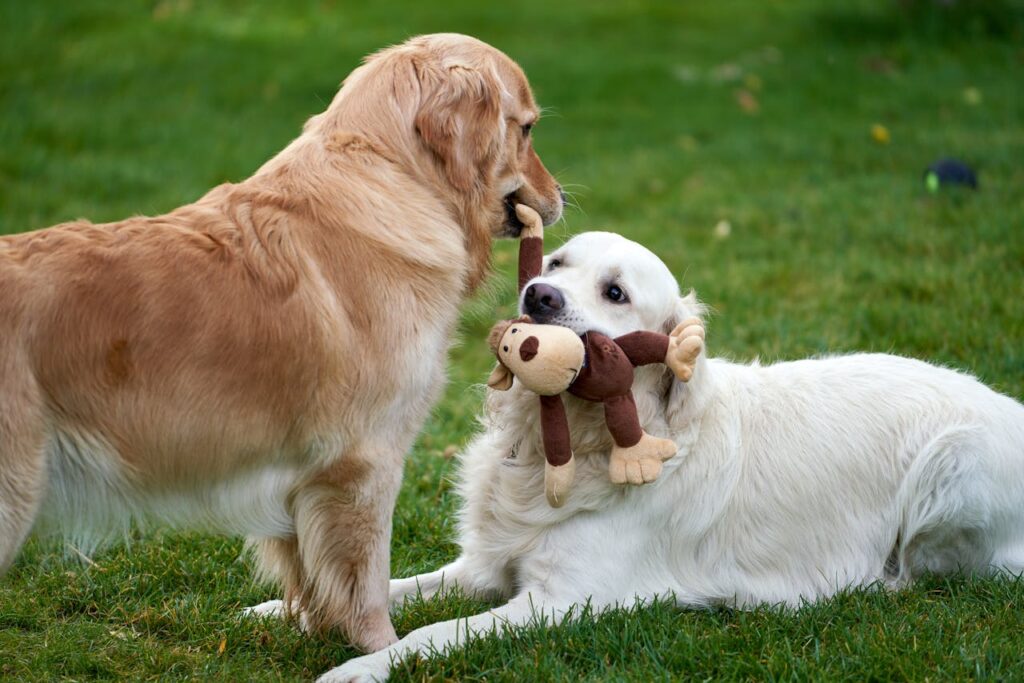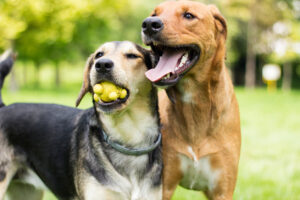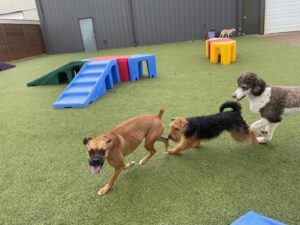Did you know that well-socialized dogs live a far more fulfilled life? Early socialization can significantly improve a dog’s overall well-being and longevity. Introducing your dog to different environments, animals, and people can profoundly impact their mental and physical health.
Socialization is not just a modern-day notion; it traces back to theories of animal behavior and psychology. Studies indicate that dogs with robust social experiences are less likely to exhibit anxiety or aggression. This positive interaction significantly contributes to their happiness and lowers stress indicators, ensuring a healthier, well-rounded companion.
Dog socialization improves health through enhanced physical activity, reducing obesity risks. It also fosters better mental health, mitigating anxiety and depression. Additionally, it strengthens immune function through exposure to various environments. Socialized dogs develop superior behavior patterns, enhancing their adaptability and interactions. These factors contribute to overall longevity and well-being.

Dog Socialization Benefits
Socializing your dog can lead to a happier and more balanced pet. When dogs interact with others, they learn key skills that help them communicate better. This interaction reduces fear and anxiety and leads to more confidence. Seeing your dog feel comfortable in various situations is truly rewarding. A confident dog is less likely to display aggressive behaviors.
Physical health benefits are another result of proper socialization. Dogs that socialize often get more exercise, whether at a dog park or during walks. This helps keep them fit and trim. Moreover, regular activity boosts their heart health and strengthens muscles. It even improves digestion and overall health.
There’s a strong connection between socialization and mental health for dogs. When dogs lack social experiences, they can become anxious or scared more easily. Socialization helps dogs handle new environments and noises without stress. The result is a relaxed and calm pet in various settings. Peaceful dogs often lead more enjoyable lives.
Socialized dogs can even influence how a household feels. A well-adjusted dog brings joy and reduces stress for their human family members. By fostering a friendly and happy dog, you contribute positively to the household environment. Dog owners often feel more relaxed with well-socialized pets. The harmony between humans and dogs makes life more enjoyable for everyone.
The Fundamental Role of Socialization in Dogs
Socialization is the groundwork for a happy and emotionally healthy dog. From a young age, exposure to new experiences, sounds, and sights can shape a dog’s personality. It teaches them how to react appropriately in diverse situations. If a dog encounters people of different ages, they learn how to behave around children and adults. As a result, they are more adaptable.
Good socialization is crucial to prevent fear and aggression in dogs. Unfamiliar settings might startle a dog that lacks this early training. Unfamiliar settings might startle a dog that lacks this early training. By interacting with various environments, dogs build confidence. This confidence often results in a balanced and approachable pet. Owners will notice fewer stress signals from their dogs in new situations.
Socialization not only benefits dogs but also their human companions. A well-socialized dog is more likely to be accepted by friends or family. This increases the bond between pet and owner. Social settings become more enjoyable when the dog is relaxed and friendly. This connection promotes overall happiness and well-being at home.
Starting socialization early is paramount to lasting effects. Some experts suggest beginning this process as early as 3 weeks old. Introducing simple experiences should be done gradually and positively. Ensure each encounter is positive to reinforce good behaviors. This structured approach helps develop a reliable and friendly dog.
The Mental Health Benefits of Dog Socialization
Socialization plays a crucial role in improving a dog’s mental health. Interaction with other pets and humans helps prevent loneliness. When dogs experience isolation, they may develop anxiety or depression. Social activities keep them engaged and mentally stimulated. This leads to a more content and energetic pet.
Venturing into new environments with their owners also helps dogs overcome fears. Dogs that are regularly socialized often display more resilience in stressful situations. This resilience results in them being able to cope better with loud noises or crowds. Participating in activities like group dog walks can significantly boost a dog’s self-esteem. A confident dog feels more at ease.
These positive mental health effects extend to both the dog and its owner. When a dog is mentally healthy, the owner’s stress levels often decrease. A well-adjusted pet is easier to manage and live with. Owners and dogs can enjoy quality time together, enhancing their bond. This connection creates a harmonious living situation.
To ensure the mental well-being of dogs, owners should encourage diverse social interactions. Owners can introduce their pets to different settings and animals gradually. Consistency is key to achieving mental stability. Introducing new experiences should become a regular part of the dog’s routine. This way, they learn and enjoy without feeling overwhelmed.
The Key Physical Health Advantages of Dog Socialization
Dog socialization brings numerous physical health benefits for your furry friend. One of the key advantages is increased physical activity. Dogs that socialize often engage in play, which promotes exercise. Regular activity helps maintain a dog’s weight and reduces the risk of obesity. Physical play also strengthens muscles and bones.
Another significant benefit is improved cardiovascular health. Socialized dogs typically get more opportunities to run and play. This frequent exercise boosts heart health and improves circulation. Dogs engaged in regular physical activities are less likely to develop heart disease. Moreover, they generally have more stamina and endurance.
Being regularly active also aids in better digestion for dogs. Exercise helps stimulate the digestive system, ensuring smooth and effective digestion. This reduces the chances of gastrointestinal issues. It also aids in regular bowel movements, keeping the dog’s system clean. A healthy digestive system means a happier pet.
Enhanced immunity is another positive outcome of dog socialization. When dogs meet other pets, they are exposed to various environments and germs. This exposure helps build a stronger immune system. A robust immune system decreases the likelihood of sickness. Dogs that socialize frequently are usually healthier and more resilient.
Regular social interactions also contribute to better joint health. Activities like running and jumping lubricate the joints. This is essential to prevent conditions like arthritis, especially in older dogs. Keeping the joints active can help improve flexibility. As a result, dogs maintain their mobility as they age.
The Importance of Dog-to-Dog Socialization
Dog-to-dog socialization is a vital part of a canine’s development and well-being. When dogs interact with their peers, they learn essential communication skills. These interactions teach dogs how to read body language and respond appropriately. Through play, they understand what behaviors are acceptable and which ones are not. This foundation helps create a harmonious environment for dogs and their owners.
Regular dog-to-dog interactions can prevent behavioral issues. Dogs lacking proper socialization might become fearful or aggressive towards others. Exposure to various dog personalities helps reduce these tendencies. Through play and positive interactions, dogs become more balanced and tolerant. A well-socialized dog is less likely to have unwanted behavioral problems.
Positive dog-to-dog meetings can also contribute to mental stimulation. Engaging with other dogs provides challenges and encourages strategic thinking. Dogs learn to navigate complex social situations. They practice patience and problem-solving through play. This mental exercise is crucial for a dog’s overall happiness.
By regularly socializing, dogs also receive the benefits of shared physical activity. Running and playing with fellow dogs keeps them fit and healthy. These activities provide an excellent cardio workout and help maintain a healthy weight. Playing in groups can also improve a dog’s agility and coordination. Physical activity is vital for strong muscles and joints.
The friendships formed between dogs can significantly boost their mood and confidence. Dogs with strong bonds are often seen as happier and more energetic. They are excited to meet their friends during outings. This excitement positively influences their moods and reduces stress. Socialization helps create a fulfilled and well-rounded pet.
Practical Training Techniques in Dog Socialization
Effective dog socialization requires practical training techniques that can enhance a dog’s ability to interact well. One valuable method is exposing dogs to various environments early. Walking them in different places can help them adapt better to changes. This exposure builds confidence and reduces fear of the unknown. It prepares them for life’s unpredictable moments.
Using positive reinforcement is another essential tool in socialization. Rewarding good behavior with treats or praise encourages dogs to repeat those actions. It helps them associate positive outcomes with good behavior during interactions. Owners can see improvements in their dog’s responses to commands over time. Positive reinforcement builds a strong bond between a dog and its owner.
Organized playgroups are also beneficial in teaching social skills. Dogs get to mingle with their peers under supervision, creating a safe environment. During these playdates, they learn essential social cues and boundaries. Such activities allow them to practice what they’ve learned. Regular participation helps improve their behavior and social comfort.
Leash training is an excellent way to introduce dogs to social settings. Keeping your dog on a leash gives you control during early interactions. It allows gradual introductions to other dogs and people. Leash training helps maintain order and safety, guiding dogs smoothly through socialization. This technique is vital for managing unexpected behaviors.
Consistency is key in all training techniques to ensure progress and success. Establishing a routine helps reinforce learned behaviors in various settings. Dogs thrive on repetition and on positive consistency from their owners. By keeping training sessions consistent, dogs learn faster and grow more confident. This reliable approach leads to a well-adjusted and happy pet.
Effects of Lack of Socialization in Dogs
When dogs lack socialization, they often struggle with fear and anxiety. These feelings can occur in unfamiliar environments or around new people and animals. A dog that is not used to different settings might react with aggression or retreat in fear. This makes outings stressful for both the dog and its owner. The world becomes a place of stress instead of excitement.
A dog without social skills might also display behavioral problems at home. Chewing furniture or constant barking can be signs of unresolved stress or loneliness. Without proper interaction, dogs may not understand how to behave appropriately. Training becomes more challenging when they haven’t learned basic commands and responses early on. Owners are left unsure about handling these issues effectively.
Health problems may arise from social isolation as well. Physical activities usually decrease for unsocialized dogs, leading to weight gain and associated health risks. Overeating is another repercussion, as boredom can drive excessive eating habits.
- Decreased activity levels
- Poor dietary habits
Together, these factors contribute to a decline in overall health.
Lack of socialization significantly impacts a dog’s ability to safely interact with other pets and humans. Unsocialized dogs have difficulty understanding body language signals during encounters, which can result in conflicts or aggression. This creates risky situations that might even lead to injuries for the less knowledgeable pet or person involved.

Frequently Asked Questions
Understanding dog socialization benefits can dramatically enhance your pet’s health and happiness. Below are some common questions answered to guide you through effective socialization techniques.
1. How does socialization help reduce a dog’s anxiety?
Socialization allows dogs to encounter new sounds, people, and environments in a controlled manner. By consistently exposing them to different situations, they learn to handle things calmly. Over time, this helps in reducing their fear of the unknown. A well-socialized dog is more likely to remain calm in unexpected situations, significantly lowering their anxiety levels.
As your dog grows accustomed to various settings, their confidence builds. This confidence aids in diminishing nervousness linked to new experiences. Ultimately, a dog that’s not anxious is more focused, showcasing better behavior in diverse environments. Reduced anxiety not only makes life easier for your pet but also strengthens your bond with them.
2. What are the long-term benefits of socializing a puppy early?
Socializing a puppy early sets the foundation for a balanced life. Young puppies absorb new experiences quickly, helping them become well-adjusted adults. Early social experiences mean they learn appropriate behavior around different people and animals. This knowledge prevents future behavioral issues like aggression or fearfulness.
In the long run, early socialization ensures your dog is adaptable to various environments. They become open to new experiences instead of shying away in fear. Furthermore, a well-socialized puppy is generally more confident, leading to a more fulfilling and enriched life. This early investment in social skills yields lifelong rewards.
3. How can dog socialization benefit their physical health?
Dog socialization often involves physical activities like playing with other dogs or walking in parks. These activities increase exercise levels, contributing to better physical health. Regular play sessions keep their weight in check and enhance muscle strength. High activity levels also benefit their cardiovascular health, making their hearts stronger.
Moreover, consistent physical activities help in boosting a dog’s immune system. A stronger immune system ensures they fight off infections more efficiently. Keeping your dog physically active through social interactions can prevent obesity-related issues. This plays a crucial role in extending their lifespan and promoting overall well-being.
4. What are some effective methods for socializing an adult dog?
Socializing an adult dog can be challenging but not impossible. Gradually exposing them to new situations is key. Start by introducing them to quiet environments before progressing to busier settings. Pair these experiences with positive reinforcement, like treats or praise, to encourage calm and friendly behavior.
Regular visits to dog parks can also help them meet other dogs. Leash training is essential to maintain control and ensure safety during these introductions. Consistency and patience are vital for successful socialization. Each positive interaction builds confidence, making them more comfortable over time.
5. How can socializing dogs improve their interaction with humans?
Socializing dogs enhances their understanding of human body language and verbal commands. As dogs interact with various people, they learn to behave appropriately. Being exposed to different kinds of people teaches them to be friendly and accepting. Dogs that socialize are more personable, reducing the chance of aggression toward strangers.
Positive interactions make dogs more trustworthy and predictable around humans. This increases their chances of being included in family activities and outings. An outgoing dog is not only a joy to have but also a great companion. The sense of security they feel translates into a healthier, vibrant life with their human family.
Conclusion
Dog socialization is a cornerstone of their mental and physical well-being. By exposing dogs to diverse experiences, they become more adaptable and confident. This not only improves their overall behavior but also enhances their quality of life. Well-socialized dogs are happier and healthier companions.
Investing time and effort into socializing your dog offers lifelong benefits. From reducing anxiety to boosting physical health, the advantages are numerous. Proper socialization strengthens the bond between pet and owner, making every shared moment more enjoyable. Ultimately, a well-socialized dog leads a fulfilling, enriched life.
"*" indicates required fields










